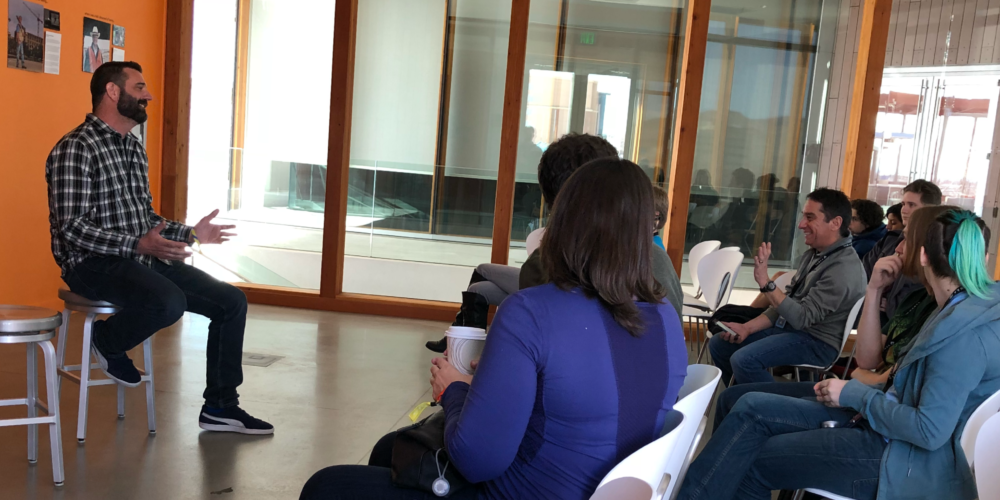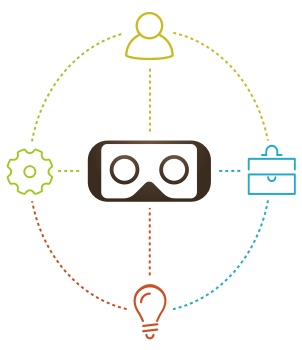
Brian Lowe, Executive Producer at HTC Vive, took to the JUMP loft room to field questions from various tech enthusiasts and aspirants. He highlighted multiple evangelist efforts and projects of Vive, including: the new Ready Player One experience, the development of Vive Pro, the evolution of Vive’s content platform (Viveport), and the relationships being explored between Vive and independent software developers. Lowe’s background is primarily in content development, from software to games, with a vision of tools on the horizon for gaming and an express focus on enterprise solutions connecting to the hardware.
Attendees represented multiple backgrounds, from library sciences, historical archiving, to sports racing. Lowe was quick to affirm that a degree of discretion was required on his part in concert with Vive’s new product, the HTC Vive Pro, and corresponding peripherals.
Gaming was a popular topic, particularly the direction of Viveport in contrast to Steam. Lowe, however, focused less-so on the innovations compared to the relationship Vive is trying to create with content creators.
Lowe described how Vive, and in a larger capacity HTC, is focused on cultivating connections with startups of nearly any level. He has acted as a liaison for many development companies, assisting on multiple levels of their business processes: From fundraising to exposure, Lowe and Vive have prioritized a broader ecosystem and corresponding partnerships. Lowe described how this process is beneficial to the virtual and augmented reality markets in a wide manner. Economics indicate competition is healthy, and Vive provides multiple resources and connections which allow new members of the industry to utilize the hardware and corresponding software in an effective, cooperative manner.
The focus of his AMA was clear by context: Vive is here to help developers and start-ups grow, and not just in regard to game development. Enterprise content was expressed as a secondary, yet crucial, priority. Industries other than entertainment have been exploring the VR revolution with great success – Particularly those based in information science.
While Lowe is based primarily out of San Francisco, Vive itself it connected deeply to various regions of China and Taiwan, possesses several connections to Los Angeles and Seattle, and works with contractors across the entirety of the United States. This market focus has not disconnected it from its competitors, however. Vive, and Lowe’s, ideology seems to be one that considers industry success a greater priority than personal monopoly. This is demonstrated quite clearly in the company’s willingness to collaborate with developers, and thus prioritize a homogenized ecosystem rather than attempt empirical control.
Another focus was the Vive Pro itself, and its corresponding potential. Wireless adapters have been a priority for many developers, and trackers have been hard to find. Lowe notes this as a progressive success which has allowed the market to diversify and create some of its core demand principles. While adoption rates are still ramping up, Vive is reacting wisely to this by focusing on software development as the hardware evolves and becomes more affordable. The original HTC Vive has become far more accessible with a $499.00 price tag, and its developer community is only growing further every day.
Lowe made it a point to express that tools themselves are one of the greatest development assets in the market. Every day innovations are stepping closer to this territory. Boise’s own Blocksmith is treading this ground, and broader innovations such as Google’s Poly are expediting the process.
Ultimately, the future of VR is rich and promising in both the gaming realm and the enterprise realm. The best thing developers can do is connect to the communities they are inherently a part of, Lowe has expressed an open desire to help accommodate this process. Vive, too, serves as a bastion of collaboration for makers and so too seekers of these innovations. As hardware becomes more evolved and more available, adoption rates are quite likely to increase. Individuals who dive in now, rather than later, are far more likely to connect with the results they are seeking. Vive is one excellent path to such optimization, and while there is time before the VR boom it is imperative that one jumps on the train well before it passes them by.
Reliquary is the media platform and portfolio of Atticus Kirkham. Atticus is a gender-fluid Idaho native of 24 years residing in the city of Boise. Their focus areas are modern literature, quantum theory applied to computing, ancient theories of alchemy, virtual/augmented reality, and general information theory. They possess an educational background in psychology and creative writing, with occupational skills oriented towards data analysis, media creation, marketing, and software development.




Recent Comments